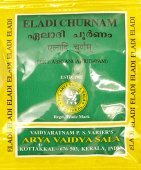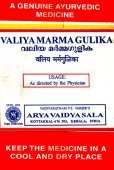Turushka, Turuṣka, Turuṣkā: 19 definitions
Introduction:
Turushka means something in Buddhism, Pali, Hinduism, Sanskrit, the history of ancient India, Marathi, biology. If you want to know the exact meaning, history, etymology or English translation of this term then check out the descriptions on this page. Add your comment or reference to a book if you want to contribute to this summary article.
The Sanskrit terms Turuṣka and Turuṣkā can be transliterated into English as Turuska or Turushka, using the IAST transliteration scheme (?).
In Hinduism
Purana and Itihasa (epic history)
Source: Cologne Digital Sanskrit Dictionaries: The Purana IndexTuruṣka (तुरुष्क).—Frank incense of white colour for dhūpa of the Pitṛs.*
- * Brahmāṇḍa-purāṇa III. 11. 69.

The Purana (पुराण, purāṇas) refers to Sanskrit literature preserving ancient India’s vast cultural history, including historical legends, religious ceremonies, various arts and sciences. The eighteen mahapuranas total over 400,000 shlokas (metrical couplets) and date to at least several centuries BCE.
Kavya (poetry)
Source: Wisdom Library: KathāsaritsāgaraTuruṣka (तुरुष्क) is the name of a kingdom that was conquered by Udayana (king of Vatsa) during his campaign to obtain sovereignty over the whole earth, according to the Kathāsaritsāgara, chapter 19. Accordingly, “The cavalry squadrons of the Turuṣkas were broken on the masses of his elephants, as the waves of the agitated sea on the woods that line the seashore”.
The Kathāsaritsāgara (‘ocean of streams of story’), mentioning Turuṣka, is a famous Sanskrit epic story revolving around prince Naravāhanadatta and his quest to become the emperor of the vidyādharas (celestial beings). The work is said to have been an adaptation of Guṇāḍhya’s Bṛhatkathā consisting of 100,000 verses, which in turn is part of a larger work containing 700,000 verses.
Source: Shodhganga: The Kavyamimamsa of RajasekharaTuruṣka (तुरुष्क) is the name a locality mentioned in Rājaśekhara’s 10th-century Kāvyamīmāṃsā.—Eastern Turkistan. Rājaśekhara mentioned it in the groups of countries included in the northern India.

Kavya (काव्य, kavya) refers to Sanskrit poetry, a popular ancient Indian tradition of literature. There have been many Sanskrit poets over the ages, hailing from ancient India and beyond. This topic includes mahakavya, or ‘epic poetry’ and natya, or ‘dramatic poetry’.
In Buddhism
Mahayana (major branch of Buddhism)
Source: De Gruyter: A Buddhist Ritual Manual on AgricultureTuruṣka (तुरुष्क) refers to “olibanum” (suitable for an offering ceremony), according to the Vajratuṇḍasamayakalparāja, an ancient Buddhist ritual manual on agriculture from the 5th-century (or earlier), containing various instructions for the Sangha to provide agriculture-related services to laypeople including rain-making, weather control and crop protection.—Accordingly [as the Bhagavān taught the detailed offering-manual], “[...] Four Nāga kings should be prepared in the middle of the ditch. [...] Decorations should be made with ribbons and banners. Worship should be performed. One should perfume agaru, sandal and olibanum (turuṣka), and combine tagara, nalada, kunduruka, liquor, parched grain, mustard seed and sarja-resin with honey. It should be enchanted with the mantra twenty-one times and incense should be offered for the Nāgas. [...]”.

Mahayana (महायान, mahāyāna) is a major branch of Buddhism focusing on the path of a Bodhisattva (spiritual aspirants/ enlightened beings). Extant literature is vast and primarely composed in the Sanskrit language. There are many sūtras of which some of the earliest are the various Prajñāpāramitā sūtras.
India history and geography
Source: academia.edu: The Chronology of Ancient Gandhara and BactriaInvasion of Turushkas.—Kalhana clearly records that Shahi kingdom collapsed after Trilochanapala due to invasion of Turushkas. Many princes of Shahi kingdom went to Kashmir and became the officials of Kashmir kings.
Source: Cologne Digital Sanskrit Dictionaries: Indian Epigraphical GlossaryTuruṣka.—(EI 5, 17, 32), originally, a Turk or a Turkish Muhammadan; later, Muhammadans in general. Note: turuṣka is defined in the “Indian epigraphical glossary” as it can be found on ancient inscriptions commonly written in Sanskrit, Prakrit or Dravidian languages.

The history of India traces the identification of countries, villages, towns and other regions of India, as well as mythology, zoology, royal dynasties, rulers, tribes, local festivities and traditions and regional languages. Ancient India enjoyed religious freedom and encourages the path of Dharma, a concept common to Buddhism, Hinduism, and Jainism.
Biology (plants and animals)
Source: Wisdom Library: Local Names of Plants and DrugsTurushka [ತುರುಷ್ಕ] in the Kannada language is the name of a plant identified with Boswellia serrata Roxb. ex Colebr. from the Burseraceae (Torchwood) family having the following synonyms: Boswellia glabra, Boswellia thurifera, Bursera thurifera. For the possible medicinal usage of turushka, you can check this page for potential sources and references, although be aware that any some or none of the side-effects may not be mentioned here, wether they be harmful or beneficial to health.
Source: Google Books: CRC World Dictionary (Regional names)Turuska in India is the name of a plant defined with Hyoscyamus niger in various botanical sources. This page contains potential references in Ayurveda, modern medicine, and other folk traditions or local practices It has the synonym Hyoscyamus bohemicus F.W. Schmidt (among others).
Example references for further research on medicinal uses or toxicity (see latin names for full list):
· Nordic Journal of Botany (1999)
· Botaničeskij Žurnal
· Blyttia (1985)
· Opera Botanica (1999)
· Botanical Magazine (2394)
· Acta Botanica Boreali-Occidentalia Sinica (1985)
If you are looking for specific details regarding Turuska, for example pregnancy safety, chemical composition, extract dosage, diet and recipes, side effects, health benefits, have a look at these references.

This sections includes definitions from the five kingdoms of living things: Animals, Plants, Fungi, Protists and Monera. It will include both the official binomial nomenclature (scientific names usually in Latin) as well as regional spellings and variants.
Languages of India and abroad
Marathi-English dictionary
Source: DDSA: The Molesworth Marathi and English Dictionaryturuṣka (तुरुष्क).—m S A country, Turan or Turkistan, the original country of the Turks.
Marathi is an Indo-European language having over 70 million native speakers people in (predominantly) Maharashtra India. Marathi, like many other Indo-Aryan languages, evolved from early forms of Prakrit, which itself is a subset of Sanskrit, one of the most ancient languages of the world.
Sanskrit dictionary
Source: DDSA: The practical Sanskrit-English dictionaryTuruṣkā (तुरुष्का).—m. (pl.) Name of a people, Turks.
Derivable forms: turuṣkāḥ (तुरुष्काः).
Source: Cologne Digital Sanskrit Dictionaries: Shabda-Sagara Sanskrit-English DictionaryTuruṣka (तुरुष्क).—m.
(-ṣkaḥ) 1. Incense. 2. A country, or m. plu.
(-ṣkāḥ) 1ts inhabitants; Turan or Turkestan, the original country of the Turks. E. tur to haste, (into amoke, &c.) affix usik, and kan added.
Source: Cologne Digital Sanskrit Dictionaries: Benfey Sanskrit-English DictionaryTuruṣka (तुरुष्क).—m. 1. The name of a people, [Rājataraṅgiṇī] 5, 152. 2. Olibanum, the resin of the Boswellia serrata Stackh.
Source: Cologne Digital Sanskrit Dictionaries: Cappeller Sanskrit-English DictionaryTuruṣka (तुरुष्क).—[masculine] [plural] [Name] of a people, the Turks.
Source: Cologne Digital Sanskrit Dictionaries: Monier-Williams Sanskrit-English Dictionary1) Turuṣka (तुरुष्क):—m. [plural] (= raṣka) the Turks, [Kathāsaritsāgara; Rājataraṅgiṇī; Prabodha-candrodaya] etc.
2) sg. a Turk, [Kathāsaritsāgara xxxvii]
3) a Turkish prince, [Horace H. Wilson]
4) Turkestan, [Horace H. Wilson]
5) mn. ([cf. Lexicographers, esp. such as amarasiṃha, halāyudha, hemacandra, etc.]) olibanum, [Jaina literature; Suśruta; Varāha-mihira’s Bṛhat-saṃhitā]
Source: Cologne Digital Sanskrit Dictionaries: Yates Sanskrit-English DictionaryTuruṣka (तुरुष्क):—(ṣkaḥ) 1. m. Incense; a country.
Source: DDSA: Paia-sadda-mahannavo; a comprehensive Prakrit Hindi dictionary (S)Turuṣka (तुरुष्क) in the Sanskrit language is related to the Prakrit word: Turukka.
[Sanskrit to German]
Sanskrit, also spelled संस्कृतम् (saṃskṛtam), is an ancient language of India commonly seen as the grandmother of the Indo-European language family (even English!). Closely allied with Prakrit and Pali, Sanskrit is more exhaustive in both grammar and terms and has the most extensive collection of literature in the world, greatly surpassing its sister-languages Greek and Latin.
Kannada-English dictionary
Source: Alar: Kannada-English corpusTuruṣka (ತುರುಷ್ಕ):—
1) [noun] name of a country in Asia Minor having an area of 301381 sq. miles and Ankara as its capital; Turkey.
2) [noun] he who belongs to Turkey.
3) [noun] a gum resin obtained from the tree Boswellia typica of the Burseraceae family and used in perfumes and as incense; olibanum; frankincense.
Kannada is a Dravidian language (as opposed to the Indo-European language family) mainly spoken in the southwestern region of India.
See also (Relevant definitions)
Starts with: Turushka-danda, Turushkadatta, Turushkaganda, Turushkagauda, Turushkagaula, Turushkaka, Turushkakarpura, Turushkatodi.
Ends with: Mahaturushka.
Full-text (+25): Turukka, Muravara, Jushka, Turashka, Turuka, Shakhin, Turushkaganda, Turushkadatta, Turushkakarpura, Taurushkika, Karevara, Tulukkaccevvanti, Turakin, Jushkapura, Hushkapura, Karabalika, Tulukkan, Dhupa, Abhimanyu, Hushka.
Relevant text
Search found 22 books and stories containing Turushka, Turuṣka, Turuska, Turuṣkā; (plurals include: Turushkas, Turuṣkas, Turuskas, Turuṣkās). You can also click to the full overview containing English textual excerpts. Below are direct links for the most relevant articles:
Amarakoshodghatana of Kshirasvamin (study) (by A. Yamuna Devi)
Daily Life (3): Perfumes < [Chapter 3 - Social Aspects]
Cosmetics, Costumes and Ornaments in Ancient India (by Remadevi. O.)
1.16. Use of Kunduruka (Olibanum) < [Chapter 1 - Cosmetics]
2.12. Pharmaceutical use of Perfumes < [Chapter 1 - Cosmetics]
Formal Education System in Ancient India (by Sushmita Nath)
The Jagaddala university < [Chapter 3 - Centres of Learning in Vedic and Buddhist Period]
Brihat Samhita (by N. Chidambaram Iyer)
Kavyamimamsa of Rajasekhara (Study) (by Debabrata Barai)
Part 8.7 - The region of Uttarāpatha (northern part) < [Chapter 5 - Analyasis and Interpretations of the Kāvyamīmāṃsā]
Appendix 2 - Identification of Geographical names mentioned in the Kāvyamīmāṃsā
The Padma Purana (by N.A. Deshpande)
Chapter 78 - Pūru Gives His Youth to Yayāti < [Section 2 - Bhūmi-khaṇḍa (section on the earth)]
Related products
(+1 more products available)





